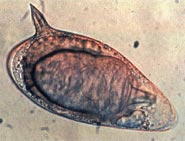
Cross-species prophylactic efficacy of Sm-p80-based vaccine and intracellular localization of Sm-p80/Sm-p80 ortholog proteins during development in Schistosoma mansoni, Schistosoma japonicum, and Schistosoma haematobium
Sign Up to like & getrecommendations! Published in 2017 at "Parasitology Research"
DOI: 10.1007/s00436-017-5634-4
Abstract: Schistosomiasis remains a major global health problem. Despite large-scale schistosomiasis control efforts, clear limitations such as possible emergence of drug resistance and reinfection rates highlight the need for an effective schistosomiasis vaccine. Schistosoma mansoni large… read more here.
Keywords: p80 p80; schistosoma; japonicum; vaccine ... See more keywords

Mastomys natalensis (Smith, 1834) as a natural host for Schistosoma haematobium (Bilharz, 1852) Weinland, 1858 x Schistosoma bovis Sonsino, 1876 introgressive hybrids
Sign Up to like & getrecommendations! Published in 2021 at "Parasitology Research"
DOI: 10.1007/s00436-021-07099-7
Abstract: Cercarial emission of schistosomes is a determinant in the transmission to the definitive host and constitutes a good marker to identify which definitive host is responsible for transmission, mainly in introgressive hybridization situations. Our goal… read more here.
Keywords: natalensis; transmission; bovis; schistosoma ... See more keywords

The epidemiology of schistosomiasis in Lango region Uganda 60 years after Schwetz 1951: Can schistosomiasis be eliminated through mass drug administration without other supportive control measures?
Sign Up to like & getrecommendations! Published in 2018 at "Acta tropica"
DOI: 10.1016/j.actatropica.2018.06.009
Abstract: INTRODUCTION Lango region is the only known endemic region for urinary and intestinal schistosomiasis in Uganda. Although there has been no significant improvement in sanitation and safe water supply in the region over years, the… read more here.
Keywords: schistosomiasis; control; epidemiology; haematobium ... See more keywords

First morphogenetic analysis of parasite eggs from Schistosomiasis haematobium infected sub-Saharan migrants in Spain and proposal for a new standardised study methodology.
Sign Up to like & getrecommendations! Published in 2021 at "Acta tropica"
DOI: 10.1016/j.actatropica.2021.106075
Abstract: Schistosomiasis is a Neglected Tropical Disease caused by trematode species of the genus Schistosoma. Both, autochthonous and imported cases of urogenital schistosomiasis have been described in Europe. The present study focuses on eggs, considered pure… read more here.
Keywords: schistosomiasis; methodology; analysis; saharan migrants ... See more keywords

Why does oxamniquine kill Schistosoma mansoni and not S. haematobium and S. japonicum?
Sign Up to like & getrecommendations! Published in 2020 at "International Journal for Parasitology: Drugs and Drug Resistance"
DOI: 10.1016/j.ijpddr.2020.04.001
Abstract: Human schistosomiasis is a disease which globally affects over 229 million people. Three major species affecting humans are Schistosoma mansoni, S. haematobium and S. japonicum. Previous treatment of S. mansoni includes the use of oxamniquine… read more here.
Keywords: haematobium japonicum; mansoni haematobium; oxamniquine; schistosoma mansoni ... See more keywords

Urogenital schistosomiasis and hybridization between Schistosoma haematobium and Schistosoma bovis in adults living in Richard-Toll, Senegal
Sign Up to like & getrecommendations! Published in 2018 at "Parasitology"
DOI: 10.1017/s0031182018001415
Abstract: Abstract Since the construction of the Diama Dam (1985), the epidemiology of schistosomiasis along the Senegal River Basin (SRB) has been extremely dynamic with outbreaks of both intestinal and urogenital schistosomiasis. In the early 2000s,… read more here.
Keywords: richard toll; schistosoma; epidemiology; urogenital schistosomiasis ... See more keywords

Comparative mitogenomics of freshwater snails of the genus Bulinus, obligatory vectors of Schistosoma haematobium, causative agent of human urogenital schistosomiasis
Sign Up to like & getrecommendations! Published in 2022 at "Scientific Reports"
DOI: 10.1038/s41598-022-09305-7
Abstract: Among the snail genera most responsible for vectoring human-infecting schistosomes, Bulinus, Biomphalaria, and Oncomelania, the former is in many respects the most important. Bulinid snails host the most common human blood fluke, Schistosoma haematobium, responsible… read more here.
Keywords: schistosomiasis; haematobium; comparative mitogenomics; schistosoma haematobium ... See more keywords

Population genetic structure of Schistosoma haematobium and Schistosoma haematobium × Schistosoma bovis hybrids among school-aged children in Côte d’Ivoire
Sign Up to like & getrecommendations! Published in 2022 at "Parasite"
DOI: 10.1051/parasite/2022023
Abstract: While population genetics of Schistosoma haematobium have been investigated in West Africa, only scant data are available from Côte d’Ivoire. The purpose of this study was to analyze both genetic variability and genetic structure among… read more here.
Keywords: bovis hybrids; schistosoma haematobium; schistosoma; haematobium ... See more keywords

Prospective cohort study using ultrasonography of Schistosoma haematobium infected migrants.
Sign Up to like & getrecommendations! Published in 2021 at "Journal of travel medicine"
DOI: 10.1093/jtm/taab122
Abstract: BACKGROUND Chronic infection with Schistosoma haematobium may lead to serious complications, including bladder carcinoma. Although it is recommended that only bladder masses not regressing within 6 months after praziquantel intake should be investigated invasively, cystoendoscopy is… read more here.
Keywords: bladder; schistosoma haematobium; study; pathology ... See more keywords

MALDI-TOF: A new tool for the identification of Schistosoma cercariae and detection of hybrids
Sign Up to like & getrecommendations! Published in 2022 at "PLOS Neglected Tropical Diseases"
DOI: 10.1101/2022.06.14.496044
Abstract: Schistosomiasis is a neglected water-born parasitic disease caused by Schistosoma affecting more than 200 million people. Introgressive hybridization is common among these parasites and raises issues concerning their zoonotic transmission. Morphological identification of Schistosoma cercariae… read more here.
Keywords: identification schistosoma; identification; maldi tof; haematobium ... See more keywords

In-depth proteomic characterization of Schistosoma haematobium: Towards the development of new tools for elimination
Sign Up to like & getrecommendations! Published in 2019 at "PLoS Neglected Tropical Diseases"
DOI: 10.1371/journal.pntd.0007362
Abstract: Background Schistosomiasis is a neglected disease affecting hundreds of millions worldwide. Of the three main species affecting humans, Schistosoma haematobium is the most common, and is the leading cause of urogenital schistosomiasis. S. haematobium infection… read more here.
Keywords: towards development; schistosoma haematobium; egg; new tools ... See more keywords